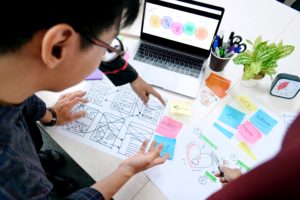What’s new at Zinc: R&D Plans for 2022
Since launching in 2017, Zinc has been experimenting with different ways of connecting scientific research, particularly from the behavioural and social sciences, with commercial innovation. We know that, if properly configured, the research and innovation system could transform society’s most pressing challenges. Our R&D team aims to reduce fragmentation in research and innovation by synthesising and translating existing evidence, working with end-users to understand their needs, experimenting with new solutions, and generating and sharing new knowledge.
This year, as part of our scale-up plans for R&D at Zinc, we are excited to be launching and expanding a number of programmes that build on our learning and progress over the last four years. Below is a summary of what we’ve got planned in 2022 — a range of programmes that focus on creating opportunities for researchers, advancing research and innovation, and supporting the development of new ventures. If you’re interested in chatting about one or more of these, please get in touch.

Photo by UX Indonesia on Unsplash
Creating opportunities for researchers:
Early-stage innovation can provide an interesting environment for researchers and scientists. We have seen the benefit researchers can bring to, and gain from, working in this context.
As our portfolio of ventures grows and diversifies, many are running collaborative research projects and working closely with researchers to refine and test their products and services. For example, Parla are continuing to leverage the research they conducted in 2021 (as part of the Wellcome-funded Taboo Health programme), as they launch new products to their community of users in the first half of 2022. Bold Health are working with UPenn and Stanford, who are running randomised controlled trials (RCTs) of their IBS product, Zemedy. And Bia Care are officially partnered with Imperial College’s Self-Care Academic Unit (SCARU), with whom they conducted research to understand women’s experience of menopause, which won the Best Research Award at the RCGP Annual Conference. To stay up-to-date with what’s happening in our portfolio more generally, sign up to our mailing list.
This year, we are ramping up our efforts to create opportunities for researchers across different career stages and disciplines.
We recently launched a new R&D Fellowships programme, supporting postdoctoral researchers to spend 12 months at Zinc. The Fellowships offer researchers the chance to work closely with entrepreneurs from the earliest stages of the founder journey — accelerating research impact, supporting product development, and offering researchers new translational opportunities and skills. We’re delighted to have received funding for the first four of these Fellowships from the UK Arts and Humanities Research Council (AHRC) and Medical Research Council (MRC). We will soon be exploring ways to formalise and grow this programme — expanding to other disciplines and recruiting larger cohorts.
In April 2022, we will be launching our first Innovation Internships Scheme, supporting a cohort of 6-10 PhD students to spend 3 months at Zinc, as an industry placement funded by UKRI studentships. With support from ASPECT, and thanks to last year’s recruitment efforts led by Ella Moonan-Howard, we are now designing a programme of support for these students, to make sure their experience is maximally valuable for their career and personal development. We still have a few spots left for PhD students who want to join the April cohort: if that’s you, or someone you know, you can find out more and apply here.
Later this year, we will be piloting a programme for mid-career researchers. This will specifically target some of the known barriers to engaging with startups, and provide opportunities for short-term immersion in the world of early-stage innovation. With funding from ASPECT, we will pilot this approach with a small cohort of mid-career social scientists, who will join us for a mix of on- and offline events over the course of several months. We’ll be sharing more details of this soon, but if you’re interested in hearing more in the meantime, please get in touch.
Delivering research and innovation programmes:
In December last year, we launched a new programme exploring ways to better connect the behavioural and social sciences to commercial service sector innovation. Funded by the Economic and Social Research Council (ESRC), this 12-month programme looks to understand and deepen the science capabilities of startups. By connecting communities of ‘applied scientists’, we aim to create new opportunities for mutually beneficial collaborations. Are you an academic social scientist working in or with a startup or scale-up? Or have you tried and failed to make a collaboration work? If you’d be up for sharing your experience, to help us shape the future funding ecosystem, we’d love to hear from you.
Also in December, we wrapped up our Wellcome-funded programme on taboo health issues (more background here). We’re in the process of writing up our learning into a couple of public-facing outputs, which we’ll be publishing over the next couple of months. In the meantime, we recently shared videos from the work we did with The Liminal Space to capture people’s stories of ‘hidden health experiences’ — check them out on our social media here.
This January, we are beginning a new digital health project that will focus on supporting new ventures to build research roadmaps and evaluation plans, experiment with agile and rapid research methodologies, and work with partners to progress a shared agenda around digital health innovation and evaluation.
Supporting academics to develop innovations for later life:
We are currently recruiting for our 3rd wave of the Healthy Ageing Catalyst Awards. This new cohort of up to 27 projects will join the 33 academic-led teams already benefiting from Zinc’s support to create innovations that improve quality of later life. The Catalyst Awards, delivered in partnership with UKRI as part of UKRI’s Healthy Ageing Challenge, enable academic innovators to develop an entrepreneurial approach to research translation. We support award-holders to develop new strategies, build new partnerships, clarify routes to market, and accelerate their journey to creating research impact. If this sounds up your street, don’t miss the call for expressions of interest, which will close at the end of February.
Working with our existing and emerging ventures:
In November 2021, we launched our latest venture-builder programme, focused on improving the mental and emotional health of children and young people. Our R&D team is supporting our talented cohort of 67 founders, to help them understand the problems within this space and develop effective, engaging products and services. This involves summarising peer-reviewed literature, supporting with user research, connecting with relevant experts, and maximising the value and quality of ventures’ experimentation. We are also grateful to our incredible network of ~100 Visiting Fellows (20% of whom are scientists/researchers), who give up their time to support founders on the programme. These include, for example, Prof Peter Fonagy (UCL & Anna Freud Centre), Dr Sarah Campbell (University of Surrey), and Dr Martina DiSimplicio (Imperial College London).
Later this year, we will launch our next venture-builder — this time, focused on helping people to reduce their environmental harms. Over the next few months, we will be engaging in research and consultation to build our Manifesto for this next mission. Based on a combination of desk research and interviews with relevant experts, the Manifesto helps us to highlight specific areas that are likely to deliver the most significant impacts in the areas of greatest need. If you’re an expert working in this space and interested in connecting, please do get in touch.
Growing the team:
To make all of these programmes and activities possible, we’re excited to be growing the R&D team. Joining Rachel Carey (Chief Scientist), Rachel Middlemass (Head of R&D Partnerships), Tim Shakespeare (Research Acceleration Lead) and Rosie Webster (Venture-Builder Science Lead), we’ve recently welcomed: Kirsten Bound (leading our ESRC-funded project on social science and commercial innovation), Salman Malik (leading our work on Innovation Internships), Claire McCallum (leading our work on digital health), and Laura McKenzie, Stephen Hills and Michelle Ulor (supporting founders in our current venture-builder). We will also be joined next month by Hannah Mackaness, to provide product and innovation support to our founders and ventures.
Exciting times ahead! If you are interested in hearing more about, supporting, or participating in any of the above, we’d love to hear from you.
Join the Zinc community
Stay up to date with all Zinc updates and future posts as part of our fast growing community.
Featured Resources
Zinc Impact Report 2024
Zinc’s mission is to make the UK the best place to successfully start a venture which can have a massive impact on the health of people and the planet.
Increasingly, we are building deeper science ventures that serve global, industrial customers in environment and health, giving access to impact at a global scale.
Our 2024 Impact Report explores the challenges that need to be tackled to empower and enable talented founders from around the world to solve critical health and environmental challenges at scale, from here in the UK.
This report showcases success stories from the Zinc portfolio, and highlights how Zinc – and our growing community of hundreds of Founders, Fellows, Coaches, Partners and Funders – are working together to build a world-leading “Science-for-Impact” ecosystem for inception stage ventures in health and environment.
Impact Report 2023
We started Zinc with the hypothesis that missions are an effective way to attract highly ambitious, talented and experienced groups of innovators, who might not recognise themselves as “classic entrepreneurs” but are ready and able to start a new commercial and successful venture to tackle some of our most pressing societal issues.
The world has overcome the sorts of challenges we face today when it has adopted a mission-based approach to the biggest problems and brought together world-class talent to invent and innovate, e.g: NASA and landing a man on the moon, the LSE blueprinting the British welfare state, or the Gates Foundation aiming to eradicate diseases.
On this basis and assumption, we designed Zinc as a new mission-based Venture Builder — a place where global talent, ‘impact makers’, can join to experiment and develop new solutions to our most pressing societal issues.


